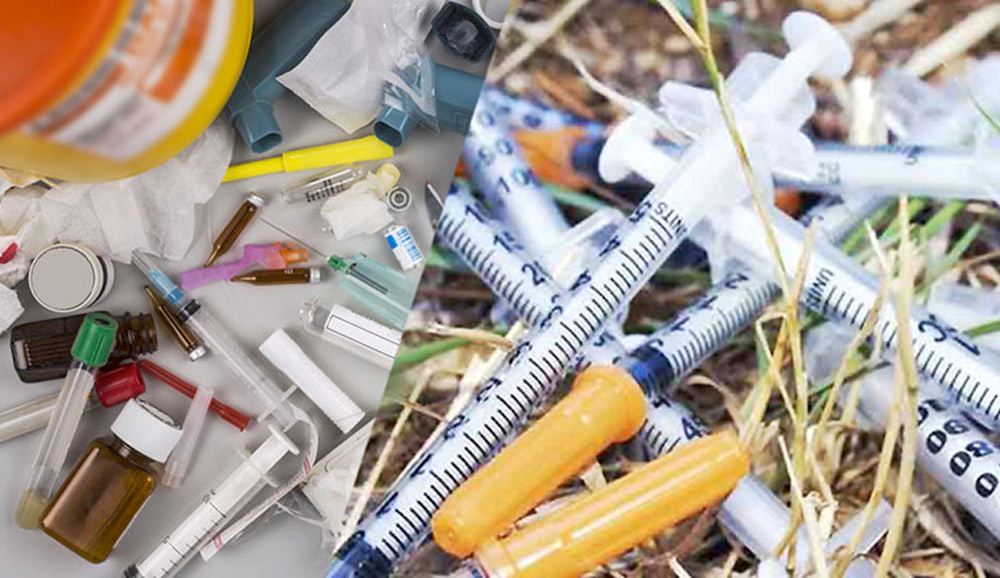Bio-Medical Waste Management
"A Waste Management Company"
Waste Management Services
Ensuring the safety of healthcare workers and the environment through proper biomedical waste management
Recyclofy is committed to providing safe and responsible management of biomedical waste for a healthier tomorrow. Our comprehensive biomedical waste management services are designed to meet the needs of healthcare facilities of all sizes.
We understand that biomedical waste poses a serious threat to public health and the environment, which is why we adhere to strict protocols and guidelines for proper handling, transportation, and disposal of this type of waste. Our team of experts is highly trained in the latest industry practices and regulations, ensuring that all biomedical waste is handled safely and efficiently.
At Recyclofy, we offer a range of services to meet the needs of our clients, including collection, transportation, treatment, and disposal of biomedical waste. We also provide training and education to healthcare staff on proper waste segregation and disposal practices.
Our state-of-the-art facilities and equipment enable us to safely and effectively manage all types of biomedical waste, including sharps, infectious waste, pharmaceuticals, and more. We work closely with our clients to develop customized waste management solutions that meet their unique needs and budget.
Choose Recyclofy for reliable and efficient biomedical waste management services that prioritize safety and sustainability. Let us help you protect the environment and public health through responsible waste management practices.

Regulations and Guidelines for Bio-Medical Waste Management in India
The Ministry of Environment, Forest and Climate Change (MoEFCC) in India has issued guidelines for the management of bio medical waste. These guidelines were last updated in 2016 and are called the “Bio-Medical Waste Management Rules, 2016.” Some of the key regulations and guidelines for bio medical waste management in India are:
Segregation and disposal: It is mandatory to segregate bio medical waste at the point of generation and dispose of it in accordance with the rules. The waste should be properly labeled, color-coded and transported in a closed vehicle to the treatment facility.
Authorized treatment and disposal: Only authorized bio medical waste treatment and disposal facilities should be used for the disposal of bio medical waste.
Record keeping: The facility generating bio medical waste should maintain records of the waste generated, collected, transported, treated and disposed of, and maintain a register of the bio medical waste treated and disposed of.
Training and awareness: Personnel involved in the handling, collection, transport, and disposal of bio medical waste should be trained and made aware of the hazards associated with bio medical waste and the measures to be taken to prevent infection and contamination.
Periodic reporting: The bio medical waste management facility should submit periodic reports to the State Pollution Control Board or Pollution Control Committee on the quantity and types of bio medical waste generated, treated and disposed of.
Penalties: Non-compliance with the bio medical waste management rules can lead to penalties, including imprisonment and fines.
The benefits of proper bio medical waste management
Proper biomedical waste management offers several benefits to the environment, healthcare workers, and the community at large. Here are some of the key benefits of proper biomedical waste management:
Reduces the risk of infection and contamination: Properly disposing of biomedical waste reduces the risk of infection and contamination for healthcare workers, waste handlers, and the general public.
Protects the environment: Biomedical waste contains hazardous materials that can pollute the environment if not properly managed. Proper disposal of biomedical waste helps protect the environment from the harmful effects of these hazardous materials.
Prevents the spread of diseases: Biomedical waste can contain infectious agents that can spread diseases to people and animals. Properly disposing of biomedical waste reduces the risk of disease transmission.
Promotes sustainability: Proper biomedical waste management promotes sustainability by reducing the amount of waste that ends up in landfills, and by promoting the use of eco-friendly waste management techniques.
Compliance with regulations: Proper biomedical waste management helps healthcare facilities comply with local and national regulations governing the handling and disposal of biomedical waste.
